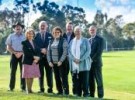The election result that all commentators and most Tasmanians could see coming at us like a freight train has arrived.
$0/
(min cost $0)
Login or signup to continue reading
Still In denial the major parties are now on the backfoot having panned their potential partners in the new parliament and having to wind back the majority government rhetoric.
Whether a coalition is organised by Liberal or Labor is on most people's mind but the much bigger issue is how policy and legislation will now be made.
Tasmanians did not vote for a majority government, they voted for a parliament. Our current adversarial approach basically assumes those elected representatives who can form a government are 'right' and that the rest of the parliament is 'wrong'.
But governments are there to serve the Parliament and the Tasmanians who elected the Parliament. This mind shift will take a while to sink in.
The most democratic approach in these circumstances, but one not raised yet by the traditional parties, is to move towards a deliberative democracy style of working.
This approach focusses on a more structured, engaging and open process for developing policy and legislation.
So for example instead of the annual budget development being a secretive internal process of the government it becomes a more open process engaging the whole parliament and Tasmanians more broadly.
Key budget policies are then broadly assessed through a range of filters including a series of ' impact statements' for example by place ( e.g. electorates ) and by people ( e.g. older Tasmanians).
This makes so much more sense than a government claiming it know best and deals being made behind closed doors often by unelected and unaccountable Ministerial private office staff.
Alongside the process of broader parliamentary engagement would be deeper engagement with Tasmanians. For example using new polling technologies to read the real time pulse on issues and more direct and structured engagement with younger Tasmanians on policy issues.
In places like South Australia and internationally citizen juries are used to weigh up arguments and advise parliaments.
Deliberative processes can happen over a number of weeks or months. If it had happened with the Stadium proposal it may not have been as divisive as it still is.
The traditional parties see collaborative parliament as a pie in the sky that is way too high but the pie is now in their hands.
Professor David Adams, University of Tasmania
Time to change political mindsets, Tasmanians voted for a parliament
 9
9
 0
26.03.2024
0
26.03.2024
The election result that all commentators and most Tasmanians could see coming at us like a freight train has arrived.
$0/
(min cost $0)
Login or signup to continue reading
Still In denial the major parties are now on the backfoot having panned their potential partners in the new parliament and having to wind back the majority government rhetoric.
Whether a coalition is organised by Liberal or Labor is on most people's mind but the much bigger issue is how policy and legislation will now be made.
Tasmanians did not vote for a majority government, they voted for a parliament. Our current adversarial........
© The Examiner
 visit website
visit website






















 Toi Staff
Toi Staff Gideon Levy
Gideon Levy Belen Fernandez
Belen Fernandez Rami G Khouri
Rami G Khouri Donald Low
Donald Low Mort Laitner
Mort Laitner Ali Fathollah-Nejad
Ali Fathollah-Nejad Nikkei Editorial
Nikkei Editorial Michael Kwet
Michael Kwet
